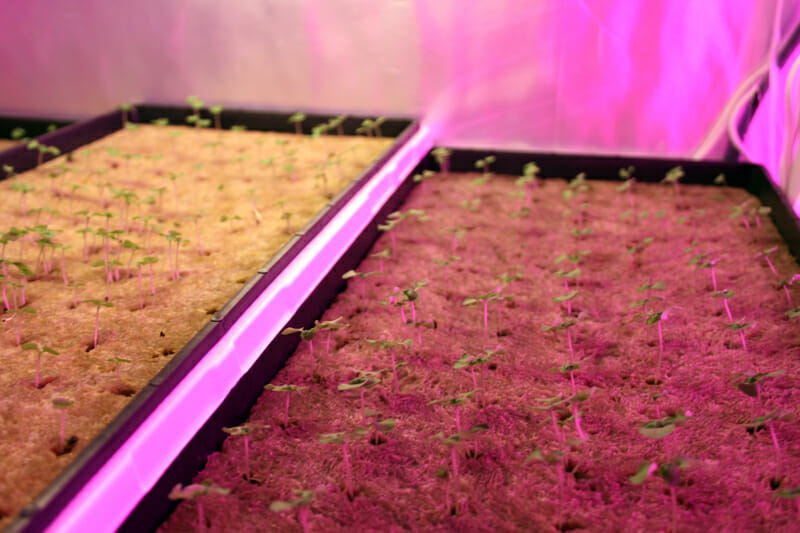It may not look like much from the outside, but these giant blue boxes could transform commercial farming in New England and beyond.

It may not look like much from the outside, but these two giant blue boxes could transform commercial farming in New England and beyond.
In 2009, Friedman, an industrial designer, and his business partner, Brad McNamara, an environmental scientist, tried to launch a company to conquer rooftop farming in the city. Costs quickly grew beyond their reach. Suddenly, shipping containers – which Friedman had been trying to turn into a living space for fun – sparked their curiosity. In 2011, they relaunched and reconceived their business as Freight Farms, aiming to build farms in areas that couldn’t support traditional methods; Friedman says they get calls from the Middle East almost every day, asking about availability.
‘Plus, marijuana and tomatoes are both very finicky, you know? If it works, it works.’
“We’re trying to take the guesswork out of commercial farming,” he explains, gesturing to a master control panel wired into the wall. “We should be able to grow a plant anywhere in the world, right?”
The set-up is straightforward: along one wall, a station is set up to usher in the seed-to-seedling process. The rest of the space is filled with rows of skinny towers facing each other, a lighting strip hanging down between them. Once the plants reach the seedling stage, they are inserted into the mesh centers of the towers, growing sideways, both rows facing towards the light. Water, infused with nitrates and phosphorus, comes up through the irrigation lines, drips down the spongy center, and is circulated back to the original tank. Plants grow by the cubic foot, and there are nearly 3,000 plant-sites in every unit. Everything about it can be controlled and monitored remotely.
Where might all this equipment hail from? You guessed it – hydroponic weed growers. “The past ten years have been full of these people expediting growing technology in their basements. Up until now all that tech has stayed in its little niche, so it’s interesting when you pull it out into the world,” Friedman explains with a laugh. “Plus, marijuana and tomatoes are both very finicky, you know? If it works, it works.”
Freight Farms’ first Boston unit was finished in February, where it pumped out up to 15,000 pounds of basil a year for local wholesaler, Katsiroubas Produce. Its Worcester unit, just outside the city, produces lettuce, basil, thyme and mint for a small handful of local companies, including Clark University. In the fall, they will begin to offer units geared towards vine crops and mushrooms.
“There are parts of the world that just cannot grow food, plain and simple,” Friedman said. “Our thing is really about supply first and foremost. Making food supply possible where it isn’t, and cheaper where it is.”
[mf_video type=”youtube” id=”Shi4JoNrlN0″]